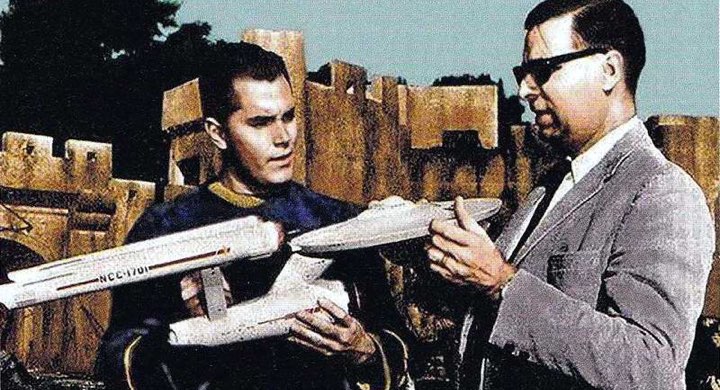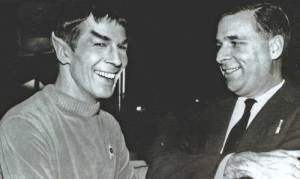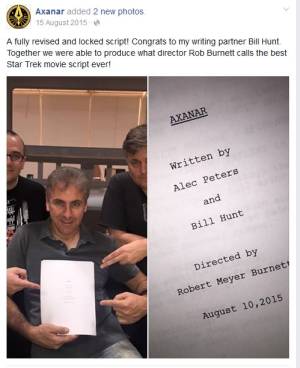Defense Gives Up on Disputed Star Trek Copyrights
Supplemental Motions Open Window into Axanar Case
Table of Contents
While attorneys in the Axanar copyright infringement lawsuit continued their dispute over what evidence should be turned over, one issue got resolved — the defense’s questioning whether CBS and Paramount Pictures could prove they truly own Star Trek.
On October 7, 2016, following up on a motion to compel discovery filed a week prior by Axanar attorney Erin Ranahan, the defense told the court that plaintiffs continued to stonewall the defense by “refusing to produce any responsive documents relating to Defendants’ investigation.”
The court documents offered a public peek at what had been going on behind the scenes during the lawsuit’s discovery period. The next step for this motion was an October 21 hearing before Federal Magistrate Judge Charles F. Eick
Trek's Copyright Ownership
First raised as an issue in the defense’s rejected dismissal motions, Star Trek’s copyright ownership re-emerged in the motion to compel discovery filed by Axanar attorney Erin Ranahan on September 29.
Gene Roddenberry
Throughout the motion to compel, Ranahan asserted that Star Trek creator Gene Roddenberry had originally owned the copyright, and that the studios’ refusal to date to provide documentation of the chain of title raised questions over whether the plaintiffs had standing to bring suit against producer Alec Peters and his company Axanar Productions Inc.
In the newest filing, the defense admitted the studios’ attorneys had provided documents authenticating CBS and Paramount indeed owned Star Trek’s copyrights:
Plaintiffs produced the missing chain of title documents on September 27, 2016 (long after they agreed to do so). … Thus, Defendants withdraw their Motion with respect to … documents related to copyright ownership.1)
While the supplemental motion did not explicitly state the defense would abandon this line of argument, the documents presumably confirmed the studios’ ownership.
Plaintiffs Stonewalling
The supplemental motion pointed to specific types of records the defense needed to make its case in these areas:2)
- Damages Alleged damages by Axanar’s infringement to the studios’ Star Trek business.
- Fair Use The fair use defense Axanar wants to mount against copyright infringement.
- Willfulness The defendants’ willfulness in committing the alleged copyright infringement. Willfulness has a specific legal meaning with regard to copyright infringement.3)
J.J. Abrams and Justin Lin
In her declaration attached to the supplemental memo, Ranahan asserted that plaintiffs’ attorneys had admitted emails between the studios and Star Trek producer J.J. Abrams and director Justin Lin’s public support of Axanar were as third parties, and therefore not privileged.
Defense Complaints
The disputed issues were chronicled in a chain of emails exchanged between attorneys on the two sides.
DOWNLOAD these court documents (PDF) regarding the defense motion to compel discovery:
Defendants' Supplemental Memo
Declaration by Axanar Attorney Erin Ranahan
Plaintiffs' Supplemental Memo
Delayed Responses from Plaintiffs
In a September 26 email, Ranahan inquired of the studios attorneys about long-delayed responses to three sets of written questions (answered under oath), known as interrogatories:
Can you please send those ASAP? Back in June you assured we would have these shortly. We would like them in advance of the depositions this week.4)
Twenty minutes later, Loeb attorney David Grossman assured Ranahan the completed interrogatories would be delivered in a few days.
Internal Discussions About the Lawsuit
Throughout discovery, Loeb has asserted that many of the documents and communication sought by the defense are protected by privilege, such as plaintiffs’ communications with their attorneys.5)
 FACT CHECK is an AxaMonitor series examining claims made with regard to Axanar, chiefly Alec Peters’ blog posts, interviews and public announcements. Read the series »
FACT CHECK is an AxaMonitor series examining claims made with regard to Axanar, chiefly Alec Peters’ blog posts, interviews and public announcements. Read the series »
But the defense specifically sought communications, not with their attorneys but among the plaintiffs themselves. Ranahan asked Loeb’s Grossman if the plaintiffs were continuing to assert “communications between non‐lawyers at CBS and Paramount about the lawsuit are covered by a ‘comment [sic] interest’ privilege. … If you are standing by this, please provide the authority for this.”6)
Common Interest Privilege
The common interest privilege Loeb asserted is sometimes known as the “joint defense privilege.“ It extends privilege beyond just an attorney and client to a third party. The privilege generally allows “persons who have common interests to coordinate their positions without destroying the privileged status of their communications with their lawyers,” and the other persons need not be parties to a suit.7) 8)
« Defendants’ counsel did not ask what the revenue for that [Star Trek] film was … but only what Paramount’s ‘expectations’ were. » — Plaintiffs’ Supplemental Memo
In his emailed reply, Grossman told Ranahan the common interest discussion to which she referred was only about whether the principle extended to discussions taking place before the suit was filed. “I believe that it does,” Grossman wrote. “Purely non‐legal communications … would likely not fall under that category. However, I don’t believe any documents have been withheld that fall into that latter category.”9)
Privilege Log
How and which records were withheld by both sides became an issue of contention, according to emails attached to the defense’s supplementary memo.
For example, Ranahan reminded Grossman that plaintiffs had agreed to produce a “privilege log” that listed what documents Loeb was withholding on the common interest basis. Under the Federal Rules of Civil Procedure, as the party citing the privilege, plaintiffs must detail the nature of the documents, communications, or items not produced in a manner that, without revealing the privileged information, enables other parties to assess the claim.10)
« It sounds like you have taken a far broader interpretation of privilege; hence, the need to review your privilege log. » — Axanar attorney Erin Ranahan to plaintiffs
While a privilege log may have been discussed at the June meeting to which Ranahan referred, Grossman said, “I don’t recall any agreement on a privilege log. They are generally not productive but if you are demanding that a log be provided, let us know when the defendants intend to provide theirs.”11)
In her reply, Ranahan recalled that she and Loeb’s lead attorney, Jonathan Zavin specifically discussed the privilege log in June. While Zavin also said such logs were not helpful, she explained that in a recent case she was able to obtain documents previously designated privileged:
We do believe privilege logs can be useful, especially in a case like this, because you are withholding documents that we may want to challenge as not‐privileged based on those that are party to the communications (which will be apparent from the privilege log itself). … It sounds like you have taken a far broader interpretation of privilege; hence, the need to review your privilege log.12)
Defense's Privilege Log
Meanwhile, Ranahan claimed defendants did not withhold any records as privileged from before the lawsuit was filed; only post‐lawsuit communications including an attorney were withheld. However, Grossman challenged Ranahan’s characterization of how plaintiffs interpreted privilege because none of the plaintiffs’ communication about whether to file suit against Axanar was conducted without a lawyer.13).
Also, based on public statements by defendant Peters, Grossman pushed back against Ranahan’s claim that no privilege log for the defense was required:
As for your assertion that there is nothing privileged that has been withheld by Alec Peters and Axanar, I am not sure that is correct as Alec has publicly stated that he has spoken with other attorneys other than you — both before and after you were retained. If you are demanding a privilege log, the defendants need to provide one as well.14)
Disputes Over Fan Films
In its supplemental motion, the defense clarified what they were striving to demonstrate by seeking information about how the studios treated fan films:
Defendants are not seeking this information to argue that Plaintiffs should have sued any other fan film. Defendants are seeking information regarding Plaintiffs’ treatment of other fan films that could demonstrate that Plaintiffs recognize the promotional value of fans creating their own fiction — a fact that can be inferred by the very existence of the fan film guidelines, and may be bolstered by other internal documents. Defendants’ expert(s) cannot analyze such documents for this purpose if Plaintiffs refuse to provide them to Defendants.
Even so, the plaintiffs responded that such a point remains irrelevant since Axanar was not to be a fan film, but (in Peters’ own words) “a fully professional independent feature.” In its supplemental memo, the plaintiffs stated:
As Defendants themselves have underscored, their work is not a fan film — it was designed to be a professional production, with paid writers, producers, actors and directors. Moreover, under copyright law, a copyright owner’s decision as to whether to pursue action against other infringers is not relevant.15)
Plaintiffs' Concerns
For their part, the studios had one of their attorneys, Jennifer Jason, filed a supplemental motion repeating the major points in their original response to the defense motion to compel:
- The defense seeks documents that do not exist.
- The plaintiffs have already agreed to provide the requested information.
- The defendants’ attorney failed to meet with lawyers from Loeb & Loeb, the firm representing CBS and Paramount in the lawsuit.
- Defense requests for a half-century’s financial records regarding Star Trek were unduly burdensome and irrelevant to the present case.
Sources for Axanar Story
In their subpoenas, Loeb asked Axanar witnesses to provide materials they used to create Prelude to Axanar and the planned feature, Axanar, but Grossman told Ranahan he was concerned Peters, director Robert Meyer Burnett and co-writer Bill Hunt had not provided all the requested sources:
They have publicly stated that documents — that have not yet been produced — were used to create the Axanar works, and yet those documents have not yet been provided.16)
Ranahan told Grossman if he was looking for a specific document, he should just ask in depositions.17) Grossman pushed back:
I requested that you speak to your clients and provide confirmation that all such documents have been produced. Your email is not responsive to that request. Please respond and confirm that all documents that were used to create the Axanar works have been produced, and that you have confirmed that fact with your clients (including Rob Burnett and Bill Hunt).18)
Representing Third-Party Witnesses
AxaMonitor reported in September that Ranahan may have reached out to witnesses not named as parties to the suit who had been subpoenaed by the plaintiffs, despite the potential conflict of interest such representation might entail (”Axanar Attorney Seeks to Represent Witnesses Subpoenaed by Plaintiffs.“)
Grossman’s email confirmed what we reported:
You have not responded to my question from last week regarding the third-party witnesses you are representing and whether you will be producing their documents this week. These deponents were [served subpoenas] several weeks ago and while we agreed to move the depositions at your firm’s request to October, we did not agree to delay the production of documents and I requested your agreement that those documents would be produced ahead of time.19)

Keywords






